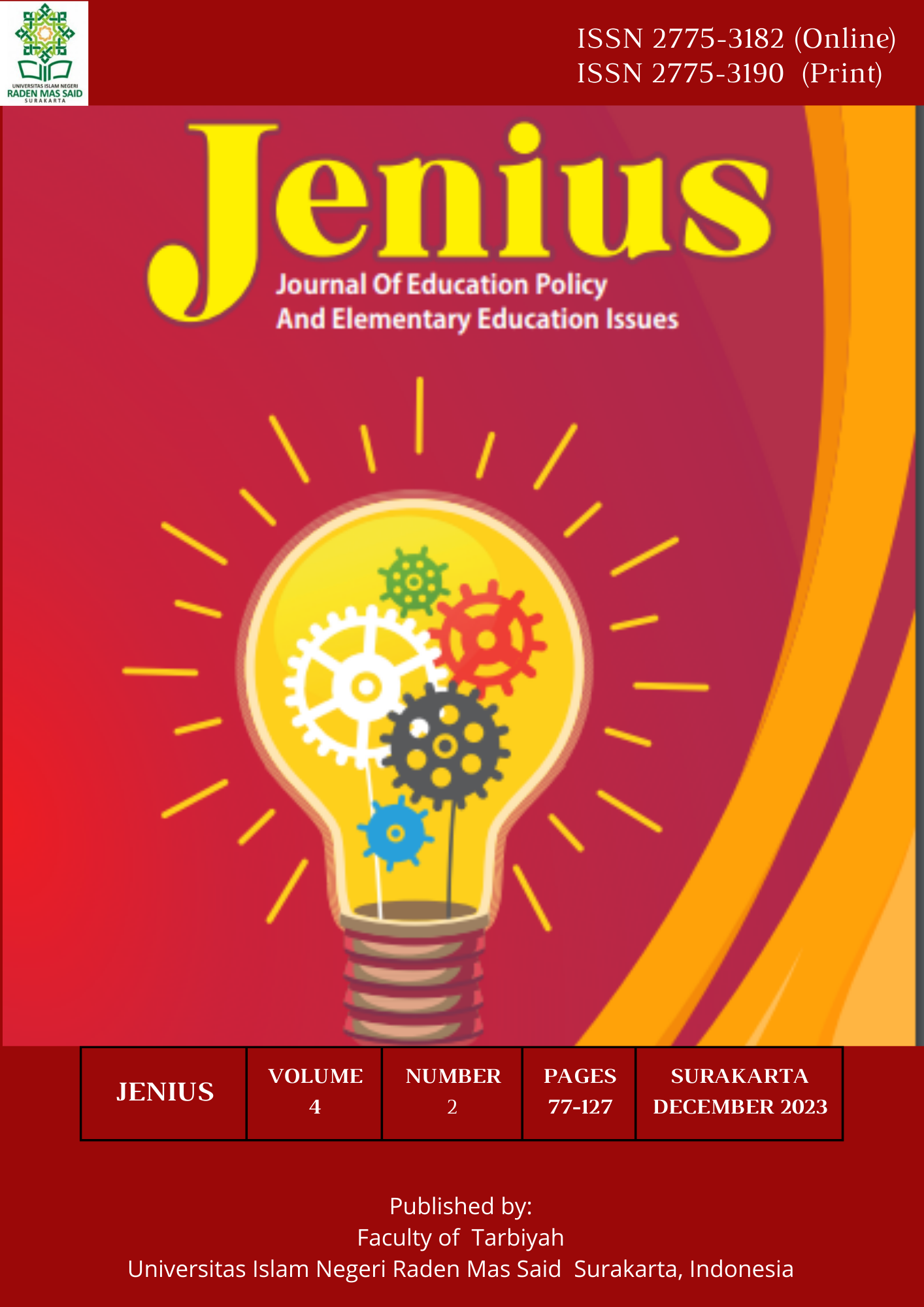Efforts to Improve Students' Critical Thinking Skills Through Scientific Approach in Elementary School
Main Article Content
Keywords
Critical Thinking Skills, Educational Efforts, Scientific approach
Abstract
This research was carried out to determine teachers' application of the scientific approach to improving the critical thinking skills of Public Islamic Elementary School 4 Sukoharjo students. The subjects of this research are class VI students for the 2022/2023 academic year. The type of research is descriptive qualitative. Techniques for collecting data are direct observation, documentation, and semi-structured interviews with teachers as research subjects and students as research informants. Based on the research results, it was found that educators in the teaching process in class VI Public Islamic Elementary School 4 Sukoharjo had implemented scientific learning in teaching and learning activities, which consisted of five activity steps, namely observing, asking, trying, reasoning, and communicating. The results obtained from applying a scientific approach to learning can make students think more critically
Downloads
References
Anjarsari, E. (2019). Faktor permasalahan pendekatan saintifik 5M dalam pembelajaran Matematika di SMA. Vygotsky: Jurnal Pendidikan Matematika Dan Matematika, 1(1), 12–20. https://doi.org/10.30736/vj.v1i1.88
Bustami, Y., Syafruddin, D., & Afriani, R. (2018). The implementation of contextual learning to enhance biology students' critical thinking skills. Jurnal Pendidikan IPA Indonesia, 7(4), 451–457. https://doi.org/10.15294/jpii.v7i4.11721
Darling-Hammond, L., Flook, L., Cook-Harvey, C., Barron, B., & Osher, D. (2020). Implications for educational practice of the science of learning and development. Applied Developmental Science, 24(2), 97–140. https://doi.org/10.1080/10888691.2018.1537791
Daryanto, D. (2014). Pendekatan pembelajaran saintifik Kurikulum 2013. Yogyakarta: Gava Media.
De Jong, T., & Van Joolingen, W. R. (1998). Scientific discovery learning with computer simulations of conceptual domains. Review of Educational Research, 68(2), 179–201. https://doi.org/10.3102/00346543068002179
Fajari, L. E. W. (2020a). Student critical thinking skills and learning motivation in elementary students. Journal of Physics: Conference Series, 1440(1), 12104. https://doi.org/10.1088/1742-6596/1440/1/012104
Fajari, L. E. W. (2020b). The effect of problem-based learning multimedia and picture media on students' critical-thinking skills viewed from learning motivation and learning styles in elementary school. Ilkogretim Online, 19(3). https://doi.org/10.17051/ilkonline.2020.735165
Fitria, Y., Kenedi, A. K., & Syukur, S. K. (2021). The effect of scientific approach on elementary school students' learning outcomes in science learning. JPsd (Jurnal Pendidikan Sekolah Dasar), 7(1), 78–90. https://doi.org/10.30870/jpsd.v7i1.10353
Glazunov, N. M. (2012). Foundations of scientific research (Foundations of Research Activities). ArXiv Preprint ArXiv:1212.1651. https://doi.org/10.48550/arXiv.1212.1651
Ilham, M., & Hardiyanti, W. E. (2020). Pengembangan perangkat pembelajaran IPS dengan metode saintifik untuk meningkatkan kemampuan berpikir kritis siswa materi globalisasi di sekolah dasar. Jurnal Ilmiah Pendidikan Dasar, 7(1), 12–29. https://doi.org/10.30659/pendas.7.1.12-29
Khuzaimah, N., Yuliani, A., & Afrilianto, M. (2023). Efektifitas pendekatan saintifik untuk meningkatkan kemampuan berpikir kritis matematis siswa kelas IX-B SMP pataruman. JPMI (Jurnal Pembelajaran Matematika Inovatif), 6(2), 541–550. https://doi.org/10.22460/jpmi.v6i2.11346
Lieung, K. W., Rahayu, D. P., & Sulili, A. (2019). The influence of scientific approach on environmental problem solving skills in elementary school students. IOP Conference Series: Earth and Environmental Science, 343(1), 12173. https://doi.org/10.1088/1755-1315/343/1/012173
McLelland, C. V. (2006). The nature of science and the scientific method. Geological Society of America.
Mutakinati, L., Anwari, I., & Kumano, Y. (2018). Analysis of students' critical thinking skill of middle school through stem education project-based learning. Jurnal Pendidikan IPA Indonesia, 7(1), 54–65. https://doi.org/10.15294/jpii.v7i1.10495
Nur’ariyani, S., Jumyati, J., Yuliyanti, Y., Nulhakim, L., & Leksono, S. M. (2023). Scientific approach to learning science in elementary schools. Jurnal Penelitian Pendidikan IPA, 9(8), 6659–6666. https://doi.org/10.29303/jppipa.v9i8.3680
Prameswari, S. W., Suharno, S., & Sarwanto, S. (2018). Inculcate critical thinking skills in primary schools. Social, Humanities, and Educational Studies (SHEs): Conference Series, 1(1). https://doi.org/10.20961/shes.v1i1.23648
Puspita, A. S., & Aloysius, S. (2019). Developing student's critical thinking skills through implementation of problem based learning approach. Journal of Physics: Conference Series, 1241(1), 12020. https://doi.org/10.1088/1742-6596/1241/1/012020
Rahmi, F. (2017). Penerapan pendekatan saintifik sebagai upaya meningkatkan hasil belajar IPA siswa kelas IV SDN 19 Koto tinggi. Jurnal Inovasi Pendidikan Dan Pembelajaran Sekolah Dasar, 1(2). https://doi.org/10.24036/jippsd.v1i2.8541
Rini, R., & Mawardi, M. (2015). Peningkatan keterampilan proses saintifik dan hasil belajar siswa kelas 4 SDN slungkep 02 tema peduli terhadap makhluk hidup menggunakan model problem based learning. Scholaria: Jurnal Pendidikan Dan Kebudayaan, 5(1), 103–113. https://doi.org/10.24246/j.scholaria.2015.v5.i1.p103-113
Rohmah, S., Kusmayadi, T. A., & Fitriana, L. (2020). The effect of the treffinger learning model on mathematical connection ability students viewed from mathematical resilience. International Journal of Multicultural and Multireligious Understanding, 7(5), 275–284. https://doi.org/10.18415/ijmmu.v7i5.1621
Saeroji, A., Slamet, A., & Khafid, M. (2018). Scientific learning approach on subject material computer application for financial administration. Journal of Economic Education, 7(1), 10–17. https://doi.org/10.15294/JEEC.V7I1.21725
Saragih, S., & Zuhri, D. (2019). Teacher behavior in students' critical thinking ability development. Journal of Physics: Conference Series, 1320(1), 12006. https://doi.org/10.1088/1742-6596/1320/1/012006
Setiabudi, A., Susanta, A., & Maulidiya, D. (2019). Efektifitas LKPD dengan pendekatan saintifik untuk meningkatkan pemahaman konsep matematika siswa kelas VIII SMP negeri 3 kota bengkulu. Jurnal Penelitian Pembelajaran Matematika Sekolah (JP2MS), 3(2), 228–241. https://core.ac.uk/download/pdf/304205588.pdf
Suwono, H., Pratiwi, H. E., Susanto, H., & Susilo, H. (2017). Enhancement of students' biological literacy and critical thinking of biology through socio-biological case-based learning. Jurnal Pendidikan IPA Indonesia, 6(2), 213–220. https://doi.org/10.15294/jpii.v6i2.9622
Syafriana, D. (2017). Penerapan model problem based learning (PBL) dalam pendekatan saintifik untuk meningkatkan hasil belajar ipa kelas v sdn 63 surabayo. Jurnal Inovasi Pendidikan Dan Pembelajaran Sekolah Dasar, 1(1). https://doi.org/10.24036/jippsd.v1i1.7932
Syarifuddin, S. (2018). The effect of using the scientific approach through concept understanding and critical thinking in science. Jurnal Prima Edukasia, 6(1), 21–31. https://doi.org/10.21831/jpe.v6i1.15312
Zaim, M. (2017). Implementing scientific approach to teach English at senior high school in Indonesia. Asian Social Science, 13(2), 33–40. https://doi.org/10.5539/ass.v13n2p33


